Politics
Turkish FM discusses Gaza aid with Egyptian counterpart
Foreign Minister Hakan Fidan had a phone call with Egyptian Foreign Minister Badr Abdelatty on Sunday, Foreign Ministry sources said. The two ministers discussed efforts to deliver humanitarian aid to Gaza and cease-fire negotiations between Palestinians and Israelis.
Egypt’s state-affiliated Al-Qahera News TV said on Sunday that two fuel trucks carrying 107 tons of diesel were set to enter Gaza, months after Israel restricted the entry of goods and aid into the Gaza Strip.
The enclave’s Health Ministry has said that fuel shortages were hindering the operation of hospitals.
Six more people died of starvation and malnutrition in Gaza over the past 24 hours, its Health Ministry said, underlining the enclave’s humanitarian emergency.
The new deaths raised the toll of those dying from what international humanitarian agencies say may be an unfolding famine to 175, including 93 children, since the war began, the ministry said.
Israel severely restricted aid access to the enclave before easing it somewhat as starvation began to spread.
Fuel shipments have been rare since March, when Israel restricted the flow of aid and goods into the enclave.
In response to a rising international outcry, Israel announced steps last week to let more aid reach the population, including pausing fighting for part of the day in some areas, approving air drops and announcing protected routes for aid convoys.
United Nations agencies have said that airdrops of food are insufficient and that Israel must let in far more aid by land and open up access to the war-devastated territory where starvation has been spreading.
COGAT, the Israeli military agency that coordinates aid, said 35 trucks have entered Gaza since June, nearly all of them in July.
More than 700 trucks of fuel entered the Gaza Strip in January and February during a cease-fire before Israel broke it in March in a dispute over terms for extending it and resumed its major offensive.
Politics
US-backed terrorists injure 7 in Syria attack as tensions elevate
Syrian media reported seven people were injured on Saturday when the terrorist group YPG launched an attack in the south of Manbij, a town liberated from terrorists in the wake of the fall of the Assad regime last year. Syrian state-run media said military units staved off an attempt at infiltration by the YPG near a village in rural Manbij, and the YPG targeted civilian areas with rockets. Media reports say four soldiers and three civilians were among the injured.
Syria’s Defense Ministry described the attack as irresponsible and without justification, while the YPG, a dominant group in the Syrian Democratic Forces (SDF), claimed it responded to an unprovoked artillery assault targeting civilian-populated areas.
In March, the YPG signed a deal with Damascus to join Syria’s state institutions.
The deal aims to stitch back together a country fractured by 14 years of war, paving the way for the YPG, which controls parts of northeastern Syria, to merge with Damascus.
However, the deal did not specify how the SDF would be merged with Syria’s armed forces. The SDF has previously said its forces must join as a bloc, while Damascus wants them to join as individuals.
A Turkish Defense Ministry source said last month that the YPG must prove it is adhering to the agreement with the Syrian government. The YPG is the Syrian wing of the terrorist group PKK, which has killed tens of thousands of people across Türkiye since the 1980s.
The group was openly supported by the U.S., which had designated the PKK as a terrorist group years ago. Washington justified the armament of the YPG as part of its anti-Daesh coalition. The YPG took control of parts of northeastern Syria after the civil war broke out in Türkiye’s southern neighbor more than a decade ago. Türkiye launched a cross-border offensive during the civil war to limit the expansion of the YPG and succeeded in confining it to a narrower area.
After the fall of the Assad regime last December, the terrorist group managed to negotiate a deal with the new administration in Damascus. The deal, which involves integration of the YPG into the new army of the country, is not final, and the YPG’s high-ranking leaders, including Ferhat Abdi Şahin, have repeatedly rejected “submission” to Damascus by disarming.
Using the recent Druze unrest that erupted at Israel’s instigation in Suwayda as an excuse, the group also demanded “autonomy” under the guise of “decentralization.”
“The YPG is committed to the March 10 deal, but its implementation will take time. Integrating 100,000 fighters into the Syrian Defense Ministry is a major operation,” Şahin said last week in an apparent about-face.
He said Damascus has formally demanded the return of government facilities in Raqqa, Hasakah and Deir el-Zour, northern cities the YPG occupies.
“In return, Damascus is prepared to approve our demands for Kurdish language and cultural rights,” Şahin said.
Şahin’s remarks follow Ankara’s warnings to “intervene” if the YPG refuses to comply with the integration agreement and follow the PKK’s example in dissolving itself.
“It’s time to integrate. Türkiye hopes no one attempts to divide Syria because we will intervene,” Foreign Minister Hakan Fidan said last week.
Şahin’s remarks also come after the U.S. has admitted the group is an offshoot of the PKK and that Washington does “not owe the group an autonomous administration within an existing state.”
“The YPG aims to turn the ‘cease-fire’ in northeastern Syria into comprehensive peace,” he said, adding that the YPG was in “constant” contact with both Damascus and Türkiye.
Politics
Turkish main opposition mayor reportedly funded journos with bribe cash
A report by the Sabah newspaper says Rıza Akpolat, a former mayor of Istanbul’s Beşiktaş district, who was arrested on corruption charges, funded journalists supportive of his Republican People’s Party (CHP). A municipality staff member handed over to prosecutors a list of journalists and others who had been paid a budget of TL 56 million ($1.38 million), which Akpolat had accumulated through bribes.
Akpolat and other municipal officials were arrested in January on charges of corruption involving a businessman who benefited from lucrative public tenders in exchange for bribery. The anti-graft probe later expanded to the Istanbul Metropolitan Municipality (IBB) and led to the arrest of Istanbul Mayor Ekrem Imamoğlu, another prominent figure in the CHP, in March.
The list includes prominent journalists with direct and indirect links to CHP, including Nevşin Mengü, Altan Sancar, Ali Haydar Fırat and Ismail Küçükkaya, as well as pro-CHP TV stations Halk TV and Tele 1.
A payment recorded in the list shows that Küçükkaya was paid TL 500,000 in March 2024, while Halk TV was paid TL 750,00 for a live broadcast. Mengü was paid TL 200,000 in April 2024, while Fırat was paid $5,000 in May 2024. The list shows that the Politikyol website, run by Altan Sancar, received TL 670,000 in June 2024, with payments recorded as “salaries.”
The list is not an official municipal record, but it was saved on a computer at the municipality building, according to media reports. It listed all payments in elaborate detail, from flight and accommodation expenses and event expenses spent by Akpolat. Media reports indicate that some individuals on the list have admitted to the making of the payments.
Similar allegations of journalists funded by CHP-run municipalities emerged earlier. Witnesses in the case against Imamoğlu have previously told investigators that Imamoğlu’s close associate, Murat Ongun, personally paid cash to some journalists in secret meetings at parking lots, in exchange for pro-Imamoğlu propaganda.
The party’s former chair, Kemal Kılıçdaroğlu, in the past implied that some journalists were funded by Imamoğlu, fueling a debate among journalists who accused each other on social media of receiving payments from municipalities. Barış Yarkadaş, a former CHP lawmaker, has claimed some journalists asked for payments in exchange for having a publicized dinner with the mayors.
Politics
Family of slain Turkish-US activist slams US senator over Israel
The family of Ayşenur Ezgi Eygi, a Turkish American activist killed by Israeli troops, has criticized U.S. Sen. Maria Cantwell for obstructing the approval of two congressional resolutions that would have prevented weapons sales to Israel.
Eygi, 26, was killed by Israeli forces after a protest over illegal Israeli settlements near Nablus in the occupied West Bank on Sept. 6. Although the U.S. called for a “swift, thorough and transparent investigation” following the incident, no accountability has been achieved. Israel’s preliminary findings claimed she was “highly likely” hit “indirectly and unintentionally” during an operation targeting a “main instigator of violent activity.”
But video evidence and witness accounts dispute this, alleging she was deliberately targeted by an Israeli sniper. Türkiye similarly launched an investigation.
Ezgi was a constituent in Cantwell’s home state of Washington.
“We asked her to explain how she reconciled this support with the pursuit of justice for Ayşenur, who was her constituent,” the family wrote.
The letter condemned Cantwell’s votes against Senate Joint Resolutions 34 and 41, both introduced by Sen. Bernie Sanders to halt planned weapons transfers to Israel, including tens of thousands of automatic assault rifles.
While Sen. Patty Murray – also representing Washington – supported the resolutions, the family said Cantwell’s opposition reflected a broader disconnect between her rhetoric on human rights and her legislative decisions. “A meaningful step, aligning with Washingtonians’ call for accountability,” they said of Murray’s vote.
“How do you reconcile your support for the U.S.-funded continuation of Israel’s internationally recognized war crimes alongside your duty to seek justice for Ayşenur?” the family asked Cantwell directly in the letter.
They argued that Cantwell’s votes created an “irreconcilable” contradiction, backing the very policies that, in their view, allowed for Eygi’s killing while blocking efforts to hold Israel accountable.
Eygi was participating in a nonviolent demonstration in the occupied West Bank when she was killed. Her death came amid soaring Israeli violence across Palestinian territories.
Since the beginning of Israel’s genocidal war on Gaza on Oct. 7, 2023, at least 1,012 Palestinians have been killed and more than 7,000 wounded in the West Bank by Israeli forces and settlers, according to the Palestinian Health Ministry.
In July, the International Court of Justice (ICJ) issued an advisory opinion declaring Israel’s occupation of Palestinian territory illegal and called for the dismantling of all settlements in the West Bank and East Jerusalem.
Despite global appeals for a cease-fire, Israel’s offensive on Gaza has continued, killing more than 60,400 Palestinians, most of them women and children.
The deaths of American citizens in the West Bank have drawn international attention, such as the fatal shooting of a prominent Palestinian American journalist, Shireen Abu Akleh, in 2022 in the Jenin refugee camp. The deaths of Palestinians who do not have dual nationality rarely receive the same scrutiny.
Politics
Türkiye irks Greece with new maritime moves, Italy, Libya ties
Türkiye and Greece have been historic foes, wrangling for influence in their immediate region. The countries recently sought to set their hostilities aside, but Ankara remains committed to preserving its maritime sovereignty in the face of a dispute with Athens over the Aegean Sea, which sits between the two countries.
Ankara announced on Saturday the designation of marine protection areas, reciprocating an earlier move by Athens that defined its marine preservation parks in the Aegean. The announcement, coupled with a tripartite summit between Turkish, Libyan and Italian leaders on Friday in Istanbul, made waves in the Greek media while the opposition decried the Greek government’s inaction against Türkiye’s rising clout.
Newly designated Marine Protected Areas (MPAs) have been officially recorded on a map registered with the Intergovernmental Oceanographic Commission (IOC) of UNESCO, according to diplomatic sources.
The updated map, prepared by the Ankara University National Research Center on Maritime Law (DEHUKAM) in coordination with relevant institutions, was submitted to the IOC last month. It includes two prominent new MPAs: one off the coast of Northern Aegean and another between Fethiye and Kaş in the Mediterranean. Additional protected areas in Türkiye’s surrounding seas are also expected to be announced.
The MPAs are intended to preserve marine ecosystems and introduce environmental safeguards, Turkish sources said. They emphasized that these zones will not affect the freedom of navigation. Coordination on legal frameworks and the status of the MPAs is ongoing between the Ministry of Agriculture and Forestry and the Ministry of Environment, Urbanization and Climate Change. Previously, the latter declared the Finike Underwater Mountains a Special Environmental Protection Area, a decision published in the Official Gazette on Aug. 16, 2013.
With the addition of the Fethiye-Kaş MPA, Türkiye is expanding its network of protected areas in the Mediterranean, underscoring its commitment to marine conservation.
To enhance inter-agency coordination and further develop Türkiye’s marine spatial planning, first announced in April and registered with the IOC in June, a Presidential Circular established the “Marine Spatial Planning Coordination Board,” published in the Official Gazette on July 24, 2025.
The board is tasked with regularly assessing the environmental impact of sectoral activities at sea and ensuring inter-institutional cooperation. The Ministry of Foreign Affairs will serve as the board’s secretariat and oversee implementation efforts.
Diplomatic sources noted that marine parks are vital tools for protecting specific sea areas while promoting sustainability. They said Türkiye aims to expand the number of these areas based on its experience in marine environmental protection.
Commenting on Greece’s July 21 declaration of two marine parks in the Ionian and Aegean seas, Turkish sources reiterated Ankara’s stance: “It is well known that Türkiye will not accept Greece’s unilateral actions or the creation of faits accomplis in the Aegean.”
They stressed that any activities involving geographical formations not ceded to Greece under international treaties, such as islands, islets and rocks, also known as “gray zones,” have no legal validity and do not affect Türkiye’s legitimate rights and interests.
These issues, sources said, have been repeatedly communicated through diplomatic channels and registered officially by the Turkish Foreign Ministry. The same points are consistently raised in meetings with Greek counterparts.
They added that Türkiye has taken reciprocal steps, including the public disclosure and international registration of its Marine Spatial Planning for all its seas in recent months.
Marine protected areas have now been declared off Gökçeada in the northern Aegean and off Finike in the Mediterranean, the sources confirmed, and both have been integrated into Türkiye’s Marine Spatial Planning map.
Looking ahead, Türkiye intends to increase the number of MPAs in all its seas without hindering economic activity, in line with international maritime law, which encourages cooperation among coastal states – especially in semi-enclosed seas like the Aegean.
While continuing to monitor developments and take corresponding actions, Türkiye maintains its call for dialogue with Greece. The Turkish government upholds its commitment to resolving disputes based on international law, fairness and good neighborly relations, as outlined in the Athens Declaration on Friendly Relations and Good Neighborliness, signed by President Recep Tayyip Erdoğan and Greek Prime Minister Kyriakos Mitsotakis on Dec. 7, 2023.
The Greek Foreign Ministry said in a statement on Saturday that the announcement of “parks in undelimited areas beyond Turkish territorial waters constitutes an unacceptable, unilateral and illegal act.”
“The Greek government consistently and resolutely safeguards the rights of our country and the sustainability of our seas. It also reminds that reactive moves devoid of substance jeopardize the good neighborly relations between the two countries,” the Greek ministry said.
Greek opposition party Syriza, meanwhile, accused the government of “downgrading Turkish provocations” and urged Athens to “take appropriate diplomatic action.”
After a long period of tensions marked by disputes over irregular migration, the Cyprus dispute, energy exploration and territorial sovereignty in the Aegean, Ankara and Athens have been taking confidence-building steps for a fragile normalization of their relations since late 2023.
The normalization sustained momentum in the past two years, with talks between leaders as well as sporadic high-level meetings of top officials to discuss sources of disputes.
Yet, both countries stand firm in their maritime rights, which are still not fully agreed upon after decades of hostilities dating back to the post-World War I period.
Turkish diplomatic power
Another highlight in Türkiye for Greece was a previously unannounced summit between President Erdoğan, Italian Prime Minister Giorgia Meloni and Libyan Prime Minister Abdul Hamid Mohammed Dbeibah in Istanbul’s exquisite Dolmabahçe Palace. The surprise summit held far from the capital, focused on energy exploration in the Mediterranean, irregular migration and the political process to restore stability in Libya, issues with immediate relevance for Greece. Greece is the main gateway to Europe for many irregular migrants, while Athens is eager for energy exploration in the Mediterranean despite objections by Türkiye, especially in maritime zones with disputed borders and near Cyprus.
Greek opposition claimed Türkiye started steering developments in the region and elevated its diplomatic role, while the Greek government lacked a strategy. Greek media, meanwhile, questioned why the government did not join the summit, as Greece was at the heart of irregular migration concerns.
Friday’s summit addressed migration and regional cooperation among other topics, according to a statement by the Turkish Presidency’s Directorate of Communications. The directorate said on Friday that Erdoğan underlined the importance of joint efforts by Türkiye, Italy and Libya in addressing the challenges facing the Mediterranean basin, including irregular migration. He stressed that long-term, sustainable solutions are needed to tackle the root causes of irregular migration, calling for greater multilateral coordination.
It was agreed that cooperation committees would convene first, followed by a leaders’ meeting to review decisions taken.
It was decided during the summit that the leaders would meet to discuss the decisions taken following the convening of the cooperation committees, the statement noted.
Libya’s Government of National Unity also issued a statement after the summit, stating that the talks addressed regional cooperation, stability and economic integration in the Mediterranean, emphasizing the importance of supporting joint strategic projects. The statement noted that economic cooperation opportunities were also discussed at the summit.
It emphasized the importance of connecting Libya to regional projects in the Mediterranean, as well as strengthening partnerships in energy, oil and gas, and infrastructure; investing in ports; developing electricity networks; and supporting joint strategic projects.
Noting Dbeibah’s call for increased regional coordination in combating smuggling networks and illegal activities at the summit, the statement said the Libyan premier also urged a quadripartite ministerial meeting consisting of Libya, Türkiye, Italy and Qatar to initiate joint projects in this regard and to combine efforts on priority issues.
In a statement, the Italian government said that Meloni, Erdoğan and Dbeibah discussed strengthening cooperation to address common challenges, beginning with the management of irregular migration flow. During the meeting, Meloni emphasized “the excellent results achieved in this regard with Türkiye,” as well as the opportunity to build on the lessons learned, including by applying them to support the Libyan Government of National Unity’s migration efforts.
“In this context, President Meloni discussed with her interlocutors a series of measures to fight international criminal networks of human traffickers, improve work to prevent irregular movements, and support Libya in managing the migration pressure it is facing,” it added.
The statement mentioned that Meloni also reaffirmed Italy’s commitment to Libya’s stability, unity and independence, as well as its support for a political process led by Libya and facilitated by the United Nations that can result in elections. The three leaders agreed to immediately resume work on a technical level to identify concrete actions to be carried out collaboratively within a clearly defined time frame.
Politics
Türkiye, TRNC deepen cooperation in security, digital governance
Türkiye and the Turkish Republic of Northern Cyprus (TRNC) explore ways to enhance cooperation on the 51st anniversary of a key Turkish operation to protect Turkish Cypriots against Greek Cypriot attacks.
Turkish Vice President Cevdet Yılmaz on Saturday met with TRNC President Ersin Tatar at the Presidential Complex in Lefkoşa (Nicosia) and discussed efforts to boost bilateral cooperation.
In a post following the meeting, Yılmaz said they discussed “steps to further strengthen Türkiye-TRNC relations in every field,” as well as regional developments, future economic cooperation and digital transformation in public services.
Turkish Vice President Yılmaz also attended a Türkiye-TRNC police service vehicle handover ceremony.
In his speech, Yılmaz said they proudly marked the 454th anniversary of the conquest of Cyprus, as well as the founding anniversaries of the Turkish Resistance Organization and the Security Forces Command, celebrated on Aug. 1 as the Day of Social Resistance.
He emphasized that under President Recep Tayyip Erdoğan’s leadership, Türkiye continues to stand by the Turkish Cypriots in all areas-from education and health care to transportation, infrastructure, energy and agriculture. Yılmaz noted that Türkiye-TRNC cooperation includes sharing expertise in public services, coordination during natural disasters and the provision of equipment and vehicles. “Under the spirit of Türkiye-TRNC cooperation, we are putting 29 new vehicles into service today – 24 service vehicles and five fire trucks,” he said. “Of the 24 police service vehicles we donated, 12 were supplied under the Financial Support Program.”
Yılmaz said that, in addition to the vehicles, 19 types of technical equipment, fingerprint scanners, mobile systems, IT infrastructure support and uniforms for motorcycle police were also provided, enhancing both institutional capacity and working conditions in the field. “A central unit has been established. With GöçNet integration and six mobile migration vehicles, border security in the TRNC is now much stronger, and efforts against irregular migration are far more effective, just as we are intensifying this fight in Türkiye,” he added.
The vice president also attended the opening of the TRNC Earthquake Monitoring and Assessment Center in the capital, established with the support of Türkiye’s Disaster and Emergency Management Authority (AFAD).
Yılmaz said they take pride in AFAD’s work and emphasized that Türkiye’s technical expertise will be shared with the TRNC. Noting that both countries lie in seismic zones, he stressed the importance of managing all phases of an earthquake effectively. Yılmaz also posted on X that the center, strengthened with nationally developed software, has brought the TRNC a science-based and data-driven earthquake analysis infrastructure.
“The system offers not only monitoring, but also critical capabilities for early warning, damage assessment and crisis management,” he noted.
TRNC President Ersin Tatar, also speaking at the opening ceremony, emphasized the importance of disaster preparedness across all institutions and thanked Türkiye for its steps to enhance the TRNC’s capacity. Highlighting the center’s value, Tatar said: “We can cooperate with the Greek Cypriot administration in all areas, especially in response to natural disasters. This center established in the TRNC has greatly supported us. I thank all those involved.”
Politics
Türkiye must brace if Israel-Iran war flares up again: Report
Türkiye must develop a multifaceted strategy to be prepared in case another war flares up between Israel and Iran, a new report from the National Intelligence Academy (MIA) has warned.
In its report, titled “The 12-Day War and Lessons for Türkiye,” the MIA analyzed the June 13-24, 2025 conflict between Israel and Iran, detailing its military, intelligence, political and technological dimensions while outlining strategic takeaways for Ankara.
The short but intense war, which quickly shook regional balances, was assessed from a broad perspective, from air superiority to cyberattacks, and from manipulation of public opinion to implications for the defense industry. The study also examined the likely trajectory of the Iran-Israel rivalry and set out measures Türkiye should adopt in preparation for potential scenarios.
The report underscored that Türkiye’s defense industry has become a priority target for foreign intelligence services and urged the adoption of preventive security policies to safeguard sector actors. It stressed that critical personnel training, early warning systems and digital protection measures will be decisive in future wars.
According to the MIA, the 12-day war was a striking example of new-generation warfare capable of producing profound effects in a short span. The conflict began with Israeli surprise airstrikes and assassination operations, culminating in U.S. strikes on Iranian nuclear facilities.
The report highlighted the decisive role of modern warfare technologies, especially airborne elements, and emphasized the growing importance of cyberwarfare, electronic attacks and digital manipulation of public opinion.
Israel’s long-standing intelligence and operational networks inside Iran were described as a key factor in its military successes, illustrating how modern intelligence structures can directly shape the course of war.
Lessons for Türkiye
The report noted that Iran tried to offset Israel’s advantages through advanced hypersonic missile capabilities but achieved limited results against Israel’s layered air defense systems.
Even so, Israel’s difficulty in intercepting these missiles despite its technological edge demonstrated, the report said, the need for Türkiye to prepare for similar threats by modernizing its air defenses and boosting anti-missile capabilities.
The war was also fought in the digital sphere. Both sides carried out cyberattacks to damage infrastructure and sway public opinion. Iran’s blocking of platforms such as WhatsApp revealed the psychological dimensions of such conflicts, reinforcing the importance for Türkiye of digital security, critical infrastructure protection and domestic software use.
Civil defense capacity
Civilian casualties in Iran, particularly in Tehran, were attributed to inadequate early warning systems and shelter infrastructure. In contrast, Israel avoided similar losses thanks to advanced civil defense systems.
The MIA stressed that Türkiye should develop comparable capabilities for its major cities, warning that civil defense capacity will be vital in any future conflict.
The report reaffirmed the importance of integrating manned and unmanned aerial systems in Türkiye’s air force and called for domestic solutions for military use of civilian technologies. It also stressed the need to boost mass production capacity and adopt long-term, multifaceted defense planning.
If diplomacy in Iran fails, the report cautioned, regional instability will be unavoidable, potentially triggering mass migration toward Türkiye, disrupting energy supplies and creating border security risks.
The conclusion was that Türkiye must be ready for these eventualities, militarily, digitally and strategically.
-

 Daily Agenda3 days ago
Daily Agenda3 days agoDigital domination must be finished – Breaking news
-
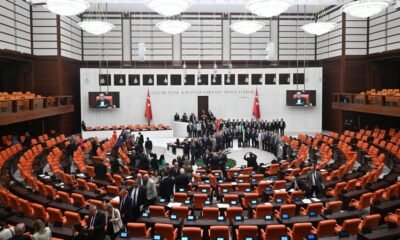
 Politics3 days ago
Politics3 days agoParties unveil members for key committee on terror-free Türkiye
-
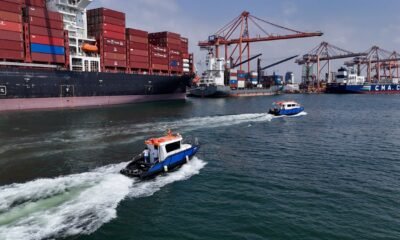
 Economy3 days ago
Economy3 days agoTürkiye says still holds favorable status despite higher US tariffs
-
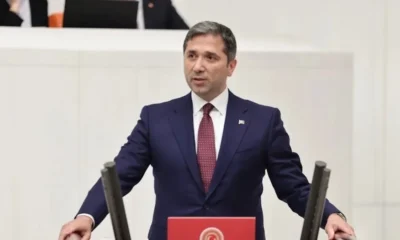
 Daily Agenda3 days ago
Daily Agenda3 days ago‘Expatriate’ response to Tanal and Enginyurt from the AK Party: We reject the ugly style
-
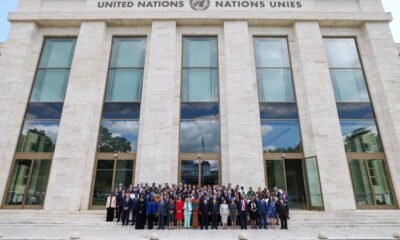
 Politics3 days ago
Politics3 days agoIstanbul to host next year’s inter-parliamentary assembly
-
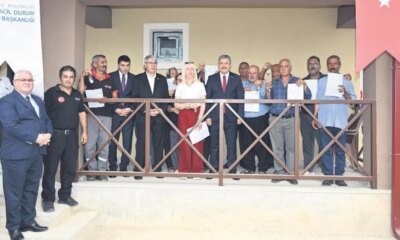
 Daily Agenda2 days ago
Daily Agenda2 days agoNew Nest happiness in Adana and Osmaniye
-
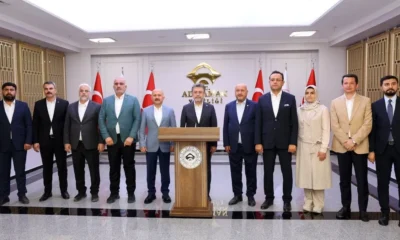
 Daily Agenda2 days ago
Daily Agenda2 days agoMinister Yumaklı met with sector representatives in Adıyaman! Turkey’s century emphasis on Turkey
-
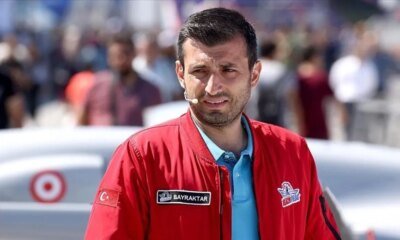
 Daily Agenda3 days ago
Daily Agenda3 days agoNext Social Description from Selçuk Bayraktar: We were subjected to cyber attacks




